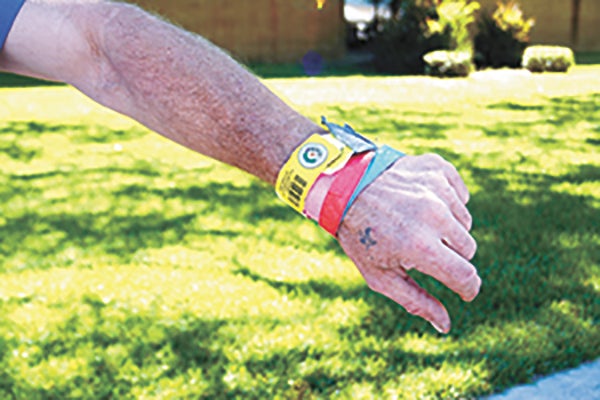Tent shelter could close soon; Emergency services help residents find transitional housing
Published 12:12 pm Tuesday, October 31, 2017

- (1) Steven Stewart displays the different colored wrist bands that gave him access to the tent shelter. Stewart was among those checking out Tuesday. (Kelsey Hammon/The News)
By KELSEY HAMMON
kelsey.hammon@leaderpub.com
Nederland resident Steven Stewart spent his final night Monday in the tent shelter established to house those displaced by Hurricane Harvey. Shouldering his remaining belongings Tuesday, Stewart was among many residents that checked out of the shelter and into transitional housing.
The encampment which has been housed in the parking lot of the Robert A. Bob Bowers Civic Center, 3401 Cultural Center Dr. in Port Arthur opened on Sept. 15, after the city requested help from the state. The shelter could close by the end of the week, but only if its residents have found transitional housing, said City Public Information Officer Risa Carpenter.
“If we can’t meet that need, we won’t shut down,” Carpenter said.
Several emergency response agencies including FEMA and ABEL have been involved in operating the shelter and working to help residents transition into housing.
Carpenter said the shelter housed 334 people during peak census. Some that utilized the shelter had been displaced by the storm, while some who used the shelter were homeless even before the hurricane struck.
For Stewart, who works as a homebuilder and construction worker, the shelter provided a place where he could get a hot meal, shower, wash his clothes and have a bed. After a long day’s work, he returned to the tent shelter and ended the night reading the Bible. He resided at the shelter for 16 days.
By Tuesday, Stewart said he was looking forward to checking out and having a room to call his own. FEMA placed Stewart in a hotel in Beaumont, where he can stay through Oct. 23. He might be able to get a further extension on that date, but is hoping to find something permanent with continued help from FEMA.
Before Hurricane Harvey struck, Stewart was renting a room. Stewart was among thousands who lost their home and most of their belongings after the storm.
“A lot of people had it worse,” he said.
Having no other option, Stewart said he was forced to live out of his truck for a week. Those days were pretty rough. Stewart said it was difficult finding food and during one day on the job a mirror fell, cutting a u-shaped gash on his right arm. Stewart went to the hospital, but it was so packed, he said it would have likely taken a day to get stitches. Instead a member of the National Guard gave him a gunshot wound kit to fix the gash. After all that, Stewart returned to his truck.
When the shelter of tents opened, Stewart said he was grateful to have a better place to lay his head at night.
“I kept to myself, but it was a blessing,” Stewart said. “It was a real, real blessing.”
Since Hurricane Harvey devastated many homes and buildings, Stewart has been working 65 plus hours to keep up with demands for housing and building repairs.
“Luckily, I have been working since after the storm,” Stewart said. “That has been a blessing.”
In the shelter residents could get food, a hot shower, air conditioning, and close washing amenities.
Stewart said he shared space in a giant tent with at least 70 other people. The tents were filled with cots and several dividers.
Each of the tent shelter residents was assigned a case worker, who among other things helped those displaced transition out of the tent and into other housing. According to Stewart, some who did not have jobs were relocated to other cities.
By Tuesday, Stewart approximated that only about 50 people remained inside the encampment.
Not everyone was happy with the accommodations, Stewart said. At night, people would have the opportunity to voice concerns during meetings. Some, he said thought the air conditioning was too high, others complained of a roof leak during a rain storm.
Stewart did say temperatures got pretty cold and Monday night, he said he wore an extra layer to sleep in.
“I look over all that,” Stewart said. “I even raised my hand and said ‘I am blessed to be here.’ People are always going to find something to complain about.”
As Stewart carried his belongings to his truck, the only thing remaining of his stay were his shelter wrist bands and FEMA bracelet. Each day was represented by a different colored wrist band that allowed those using the facility to have access coming and going from the encampment. Stewart wore three different colors for the last three days of his stay.
The experience has inspired him to consider working for one of the emergency response agencies. Stewart said he has done that type of work in the past.
Also leaving the shelter Tuesday was Mary Hatch. Her son, Derrick Evans, of Port Arthur, helped her to carry her remaining belongings. Hatch uses a walker and as she took her final steps away from the shelter, she had nothing but good things to say about the tent that had been her shelter.
“They have been nice to me and everything,” Hatch said. “They are a God send and God bless them. I wish them the best of luck. I thank them for everything that they did for me.”
Hatch said she had no idea what would have happened to her if not for the temporary tent housing. After leaving the shelter, she said she was going to Recovery Mission, a home for those who needed shelter.
Hatch was also given some funds to find a new place and some gift cards to help her get started.
“Since I have been coming to check on her, they have been trying to help her find a place,” Evans said.





